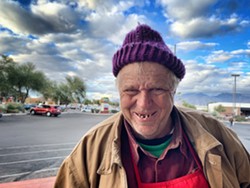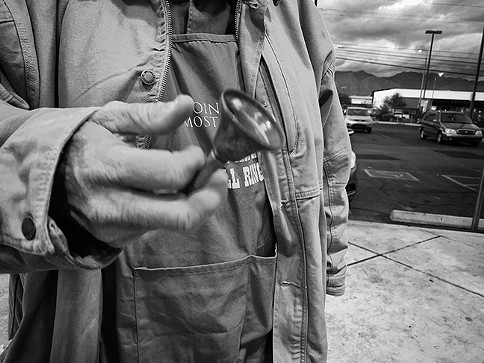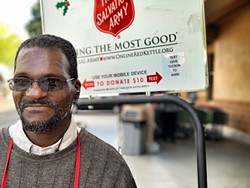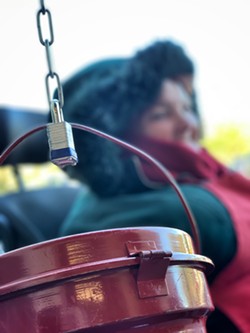A guy with long fingers and wiry legs rolls up on a tattered woman's bike. Beat green coat, skull beanie. He's of inscrutable age. Could be 65 or hard-road 35. Sets his bike against the trash receptacle and moves toward the bright entrance of Walgreens. Gregory Lewis, the Salvation Army bell ringer, stops him, and, for whatever reason, asks his name and if he's a war vet. The guy nods, says, "Charles." He's aloof, maybe angry. A Samuel Jackson as Zeus Carver countenance.
Lewis, who has never before met this guy Charles, says to him: "I love you brother. There's always a first time for us to love one another."
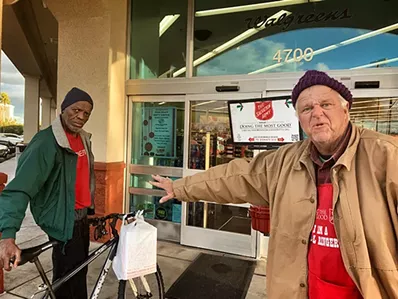
The comment disarms. Charles stops, glowers at the bell ringer. I'm thinking a punch over a handshake. I am wrong. Their hands lock and arms flop up and down.
"He fought for this country," Lewis says, as Charles moves through the Walgreens door. "He probably doesn't have much money, maybe enough to get through the day. And maybe I can make him feel prouder." Some seconds pass. "I'm just giving you the comedy of things—the humorality."
The 60-year-old Lewis is working Salvation Army's Red Kettle Campaign. The "red kettle" donation bucket dangles from a chain, beneath the official Salvation Army donation sign and logo, locked to a portable stand rising maybe seven feet. It greets the Walgreens customers at East Broadway Boulevard and North Swan Road. There's his hand-held Salvation Army bell, with the wooden handle, which he shakes so hard sometimes it creates ear-ringing overtones.
His face is haggard, melancholy, sweet. His two remaining lower front teeth rotate in a fleshy gum when he talks. There's little bone to secure them in place. He wears a red Salvation Army bib, knit purple beanie, sneakers. There's something formal about his affect because he believes hard in his work. He's one of those guys who makes you feel like he's been waiting all day for you to show up. Add a white beard and he could be old St. Nick.
He quotes Martin Luther King Jr., as a flurry of customers amble by, the one about how a street sweeper "should sweep streets even as Michelangelo painted." He mentions God often, too—he's hardcore church-y—but manages Bible talk without the idiot wind of the righteous, even if it's tempered with iffy optimism. "I do my best to help people every day to get rid of the race and hate problems. I just say, 'I love you.'"
And that's what he says. I hang with him for hours.
He tells stories of his machinist dad, of working full time at the old A.J. Bayless grocery store while attending Tucson High, and graduating back in '76. His first car. But talk of his deceased parents gets "too private. But I will say this, my mother was my angel."
Something tripped this guy up along the way. Something. His résumé is work "no one else would take, like shoeing horses." His bell-ringing is performance; the made-up words, the humor—perhaps a balancing act, a cover for some anger toward injustice or other inner agony. "I went through some tragedy," he says, ringing that bell hard. "I'll tell you when we have more time."
His days are spent making use of "lots of libraries." Many nights at bowling alleys, "not to roll balls but to watch all the people and stay warm." Churches help too. He's like an allegorical character for the SA missive. "Homeless?" he says. "I hate that word. You're stripping me of my dignity when you call me that. It's judgment. Me, I'm just on a longer vacation." Says he sleeps in private areas, usually near a hotel whose gates lock at night. "That way I can tell people I stay at hotels. It really confuses the cops."
He rides his bike everywhere and manages to afford storage space for his things, to keep from further humiliation. "I used to roam around with my stuff here and there. One day a city worker—said he was flood control—comes along and says, 'Thank you very much.' Lost my tent, clothes, everything, and the guy laughed. He said. 'We don't like homeless people sleeping under a bridge, so I'm teaching you a lesson.' The guy just had the power to take my stuff."
He grins, "See my humoration?"
Lewis stops a young black woman pushing a cart into Walgreens and launches into a little parable involving Santa, employing a line from Cheech and Chong's "Santa and His Old Lady" to illustrate, where the real Santa's debauched, working undercover as a Salvation Army bell ringer.
He returns to the donation pail. "I try to conceal things in humor," says the man who grew up adoring Redd Foxx on TV's Sanford and Son. "In order to get ahead you have to work in comedy with people. If you haven't got something to make people laugh, you haven't got the tools."
Minutes later the same woman steps out of Walgreens and stuffs a fiver into the kettle.
"Even when I get depressed in some way," he says, "this pulls me through it." During tax season he dons the Statue of Liberty costume and pimps Liberty Tax on the street. The two jobs he can get now.
"I got turned down for jobs all the time because of my teeth. It's very hurtful. So, I say to those people, 'I hope you are never in my position.' That's the only way I can deal with the pain."
He continues, "And I'm teaching homeless people out here how to survive, too. What allows them to get nastily treated. Try dressing like a homeless person, see how you get treated. Try it out sometime. See the humor in it!"
His longtime dream involves purchasing land in Tombstone to be around folks from all parts of the world, to exercise his expertise on all things Southwest, like Doc Holliday and ranch work. A perfect day for him would be not having "to reach into my wallet. Because I've always battled income problems."
The brilliant Lucky Wishbone starburst neon sign comes alive over across the street, and cold air gusts through the Walgreens lot, lending a slight air of festivity to the area. Signals Lewis' shift is about to end.
I leave, saying I'll find him tomorrow. Scribble my number for him to call, to tell me where he'll be stationed. He calls the next morning to say he wasn't assigned a location. That's the last I hear from him.
The Salvation Army red kettles and bell ringers are familiar holiday reality. In Tucson this year, there are about 120 storefronts sporting SA kettles between Thanksgiving and Christmas Eve. The unmarried and childless Lewis, like others here—the first three I found—signed on at the local Salvation Army office to become an official bell ringer. None say they've been robbed. Orientation mostly involved an instructional film on how to treat people and present oneself. Positions are volunteer but Lewis and the others receive minimum wage.
Each red kettle bell ringer goes through a "thorough background check," says Sandra Oh, Tucson area Salvation Army coordinator. "There have been some problems in the past."
The SA is a Christian charity, upholding beliefs and assisting the poor. It's the second largest charity in the United States, and its holiday donation drives are a large part of that. (The holiday tradition dates back to 1891; money raised can assist the needy year-round.) To be sure, folks have had beef with the Salvation Army. For example, its treatment of LGBTQ folks—and its views on gay marriage—have been called into question. (An LGBTQ page on their website proclaims the Salvation Army treats all with equal respect. Lt. Col. Ron Busroe, the SA's National Community Relations and Development Secretary, has gone on record a number of times saying it's false, they won't help you because you're gay or transgender.)
Lewis says he's been ringing the SA bell during holiday seasons on and off for 20 years. He's out here eight hours each day, standing. "I don't get tired," says the diehard Michael Jackson fan. "I can dance." He offers up a little dance to illustrate. "If you stand in one place too long you get depressed."
This older woman with a sour face in an oversized gray sweatshirt drags her feet across the Wal-Mart parking lot. Keith Lowery spies her through a sudden swarm of Saturday afternoon shoppers. "Watch this!" he says, and cuts across the lot to her. "Hello beautiful!"
A smooth, practiced move, to be sure. Would be super-creepy in any other scene. Her shy grin and surprising laugh is enough. She steps to the queue of shopping carts at the entrance, yanks on one and rolls into the store. Indeed, a bounce in her step.Lowery returns to the red kettle. "It's the small things," he says.
He shakes the Salvation Army bell in rhythm to the Teddy Pendergrass in his earbuds, converses with me, greets shoppers, and seems patient and selfless. Dude exists in a constant state of bemusement.
There's a faint southern twang to his voice. His gray slacks-and-sweater combo, his shirt buttoned all the way up, his dark specs, slender build and handsome face all show a kind of graceful élan, like a jazz man from a different era. A man out of place. His stuffed backpack rests near the Salvation Army kettle.
Born in Ohio and raised in Kentucky, Lowery's a war vet, served 1982-86. Says he once beat up a white major who wouldn't let him into Officer's Training School because he happened to be black. He still received an honorable discharge, proving him right in a world of wrong. He qualifies the fight thusly: "I took one for the team, I really did."
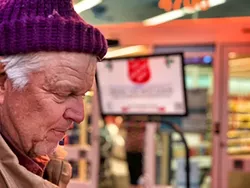
Lowery's parents were military too, and left for Europe leaving Lowery to be adopted by his white godparents when he was about 8 years old, raised in a level of class privilege that, he says, didn't exactly rub off.
"Hell no," he says. "They were tighter than super glue."
After service, Lowery left Kentucky and spent 32 years in Las Vegas, working as a tax preparer. He landed in Tucson because "it's a good military town." That was last spring. His only wife died of cancer years ago, and their one child, a daughter, is now a schoolteacher in Kansas City. He's no stranger to homelessness either, and says something about betting on sports but doesn't elaborate. The Salvation Army helped him upon his Tucson arrival. Gave him food, shelter. He now has a home and also works as a hospital custodian, he says.
He's enrolled in anger management classes too. "Four days a week for six months." Acknowledges he had it coming, got arrested "cussing people out. Yes," he adds, "that is an assault."
The classes helping?
"They are." And he says, as if addressing some perceived flaw, "I know I like to make others happy. If I can greet 100 people a day and make one of them happier, I'll feel better."
He won't elaborate on exactly why he cussed anyone out, but one conversation suggests it might have something to do with shifting power dynamics inside Trump's racist America. Or not. Lowery shrugs at the suggestion. "I just tell people, y'all shouldn't have voted for him. His father was a crook, what did you expect?
"Anyway," he adds, "Now I just kill 'em with kindness. I'll say, 'Have a blessed day' and they don't even know what to say."
The salvation army bell dangles from a rubber band attached to her gloved fingers, dings softly in the light wind. Low-volume IHeartRadio Christmas classics play on her handheld. Gives a cozy holiday undercurrent to a sonic assault of slamming car doors, laughing firemen and mothers pushing rattling carts. It's the mid-morning shade in front of Bashas' grocery, and she's dressed for freezing in a big bulky green overcoat and heavy moccasins. A Christmas-y blanket covers her legs. Elbows on the wheelchair's armrests. Folks stop, the old and the young. The sympathetic expressions, and donations get stuffed often into the red kettle. Last year, she says, someone donated $500. Her caregiver confirms.
I try and imagine the psychological distance between this woman in a wheelchair named Susan Moss and the thousands who stroll past her on a day like this. The internal hectoring and torment, the external judgment. The things we take for granted, the walking, jumping, dancing, jumping on a bike, these movements people perform right in front of her today, or in front of her entire life.
And she chooses to split any psychological or physical distance with well-timed comic self-deprecation: "Hey I get to bring my own chair!" (Her caregiver of five years, Rosa Papilla, tells me Susan frequently pokes fun at herself.)
"People are unsure of the unknown," Susan continues, "and sometimes that brings out the prejudice. They don't know about me. Everybody with a challenge has to trailblaze and make a niche somewhere. Look, I'm in pain 24 hours a day. Even right now I try really hard to hide the spasms. My choices are I can be veg, or I can live my life."
Susan was born with cerebral palsy. Yet she graduated from UA with a degree in marriage and family counseling. (She lifts her arms slightly and sings a glimpse of the UA pride song: "Bear Down Arizona, bear down!" And says, "I don't really do the arm lift thing.") Call that graduation near impossible. It's impossible for her to land a job in her chosen field too. She interviews. No one hires her. Not ever. I ask why. She answers only with a slight bristle, and a look that says this: Hey, I'm in a wheelchair, I suffer from cerebral palsy. No one wants to chance a woman like me.
No, her life has not been happy. Not by any traditional measurement anyway. We talk about that. But first she says, "I learned a long time ago that I can't be bitter. Count your blessings every day. What's the point of being bitter?"
She weighed 2 pounds, 14 ounces at birth. ("I was a teeny baby; dropped on my head once too.") She was the sixth of seven children in 1961, five of whom died of natural causes before she was born. Her younger brother, Harry, the only sibling she ever knew, lived to be all of 8 years old. Bad lungs got him. Talking about him is the one time she winces: "Harry's in my heart," she says.
By 1970, all of her siblings were gone. Her parents called her the miracle child.
"I was fortunate I was born in 1961, health care had advanced in a short time. Still, by all accounts I shouldn't be here. I've had so many surgeries in my life. I was even hit by a car at UA."
Still, death was everywhere after the family moved to Tucson from San Bernardino, California, when she was young. Her dad, a vet Marine sergeant who served in Korea and 'Nam, died in 1990, in Israel, working for General Electric. He was only in his 50s. Not until dad died could Susan talk about her six deceased brothers and sisters.
She'd spend her pre-high school days in self-contained classrooms filled with children with disabilities. She'd make friends only to see them die. "You go home on Friday and Johnny would be there and then you come in on Monday he'd be gone."
As a freshman in 1976 she was the first differently abled person to attend Catalina High School. She'd dress up like everyone else for social gatherings but wound up hiding behind the punchbowl while "everybody was having fun."
"It was tough. They wanted to lock me away and Mom said, 'She needs an education!' When they tell you that you're the first of your kind, and if you succeed it will allow other disabled kids to attend mainstream high school. That's a lot of pressure to put on a kid. And people look at you with disability and they think you're stupid. So I studied hard."
Susan's mother died in 2010, and that's when she became a Salvation Army bell ringer. (She's also an independent fragrance consultant, working for Gold Canyon Candles in Chandler, Arizona.)
"For me, this is about giving back," she says. "My mom would always say, the world will not accommodate to you, you have to accommodate to them."
This year she's rung the bell in front of Walgreens, Wal-Mart, and now this Bashes' at Kolb and Sunrise. Working every day until Christmas Eve. Ringing, soliciting donations. Her husband bell rings too, at different locations. He's an older gentleman, she says, a retired English brewery worker whom she met in a Tucson church. "He's like a living history book. His mother once led the Salvation Army band." She smiles, "He was the first person who I never felt disabled with."
Menaced by physical pain, she manages to "find joy by trying to make a difference every day. I always felt that I was here for a reason. Being born premature, with all the surgeries. Something kept me here." She tells of a woman she hugged earlier in the day: "She was crying. Her husband just died. It was her first Christmas without him. I just could understand."


